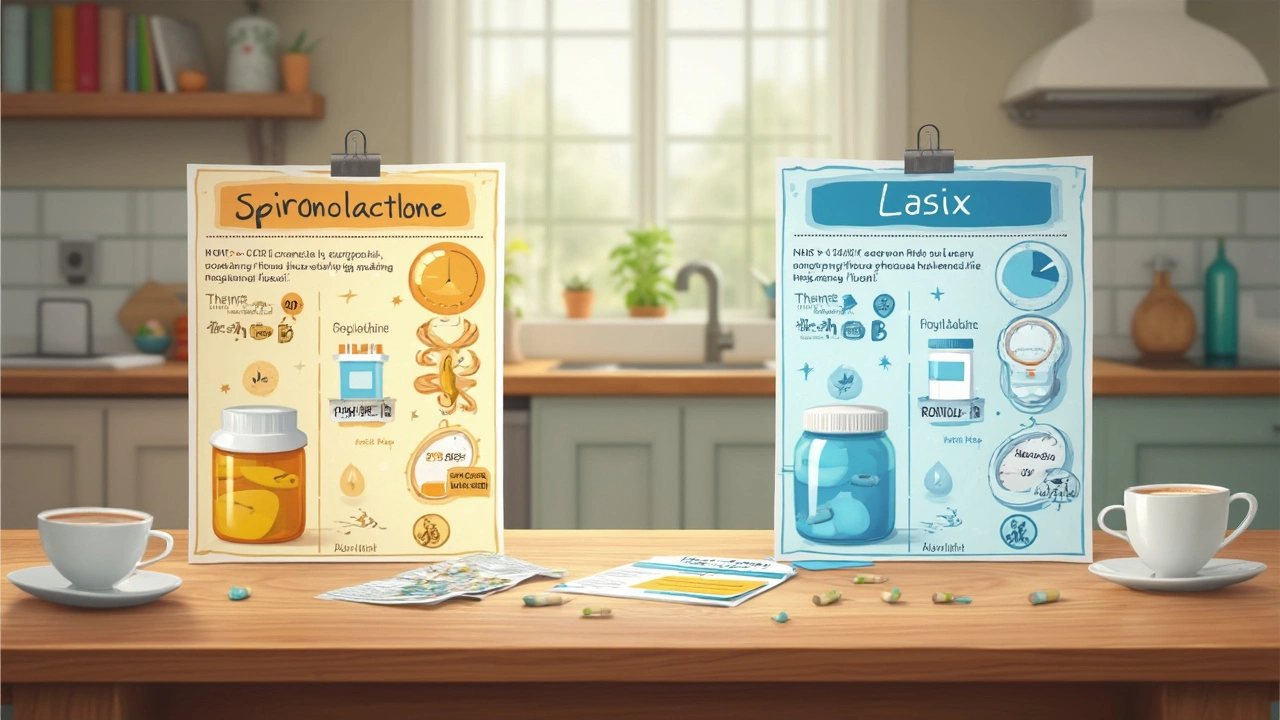Diuretics: What They Are, How They Help & When to Use Them
If you’ve ever heard a doctor mention “water pills,” they’re talking about diuretics. These medicines help your body get rid of extra salt and water through urine. By doing that, they lower blood pressure, reduce swelling, and make the heart’s job easier.
How Diuretics Work in Simple Terms
Think of your kidneys as a coffee filter. They decide what stays in the bloodstream and what gets flushed out. Diuretics tweak that decision‑making process. Some tell the kidneys to let more sodium pass into the urine, and water follows the salt. Others block the reabsorption of certain ions, which also pulls water out.
The result? Less fluid hanging around in your veins and tissues. That’s why people with high blood pressure, heart failure, or kidney disease often get a prescription for a diuretic.
Main Types You’ll Encounter
Loop diuretics (e.g., furosemide, bumetanide) are the strongest. They act on the loop of Henle – a tiny tube in the kidney – and dump a lot of fluid fast. Doctors choose them for serious edema or when they need to clear fluid quickly.
Thiazide diuretics (e.g., hydrochlorothiazide, chlorthalidone) are milder but work well for long‑term blood pressure control. They hit a different part of the kidney and are often the first pick for hypertension.
Potassium‑sparing diuretics (e.g., spironolactone, triamterene) keep more potassium from being lost. Since many diuretics push potassium out with water, these help balance that effect. They’re useful when a patient already has low potassium levels.
There are also combined pills that mix a thiazide with a potassium‑sparing agent. One pill, two actions – convenient for many patients.
Common Reasons Doctors Prescribe Diuretics
- High blood pressure (hypertension): Reducing fluid volume lowers the force against artery walls.
- Edema: Swelling in legs, ankles, or lungs often comes from fluid buildup; diuretics pull that excess out.
- Heart failure: The heart can’t pump efficiently, so fluid backs up. Diuretics ease the load.
- Kidney disorders: Some kidney conditions cause sodium retention; a diuretic helps correct it.
Safety Tips and Side Effects to Watch
Diuretics are generally safe, but they’re not without quirks. The most common issue is low potassium, which can cause muscle cramps or heart rhythm problems. That’s why doctors may add a potassium‑sparing drug or suggest a dietary boost (bananas, oranges, spinach).
You might also notice more frequent trips to the bathroom, especially early in treatment. It’s normal, but staying hydrated with water – not sugary drinks – is key.
Rarely, loop diuretics can cause dehydration, low sodium, or kidney strain. If you feel dizzy, light‑headed, or have a sudden drop in weight, call your provider.
Practical Advice for Taking Diuretics
Take the pill exactly as prescribed – usually once in the morning to avoid nighttime bathroom trips. Pair it with a small snack if it upsets your stomach.
Check your blood pressure and weight regularly. A steady drop in weight signals fluid loss, which is good; an abrupt fall might mean you’re losing too much water.
If you’re on multiple meds, ask how they interact. Some antibiotics, NSAIDs, or lithium can blunt a diuretic’s effect.
When to Talk to Your Doctor
Call if you notice persistent muscle weakness, irregular heartbeat, severe dizziness, or swelling that doesn’t improve after a week. These could mean the dose needs adjusting.
Remember, diuretics are just one piece of the puzzle. Lifestyle changes – low‑salt diet, regular exercise, and weight management – boost their benefits.
Understanding what diuretics do, the types available, and how to use them safely puts you in control of your health. Keep these tips handy, and you’ll get the most out of your prescription without surprises.
Struggling to choose between Spironolactone and Lasix? This article breaks down how these popular diuretics work, their dosing differences, and what side effects to watch out for. You'll find surprising facts, useful comparison tables, and practical tips. Whether you're managing swelling, blood pressure, or a heart condition, this guide will help you make sense of the options. Get ready for a straightforward, honest look at what sets these two water pills apart.
Apr, 29 2025

